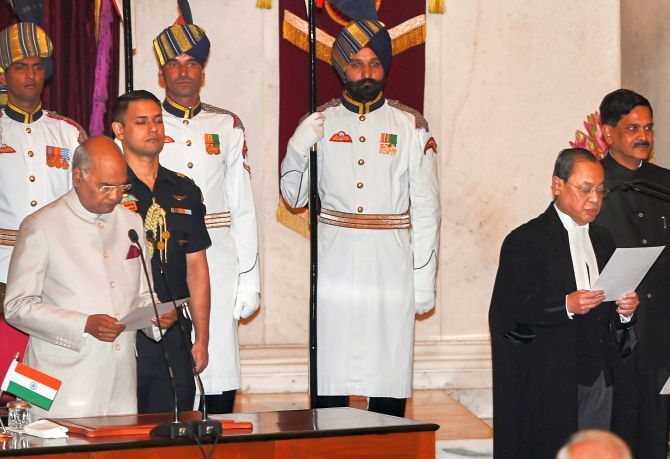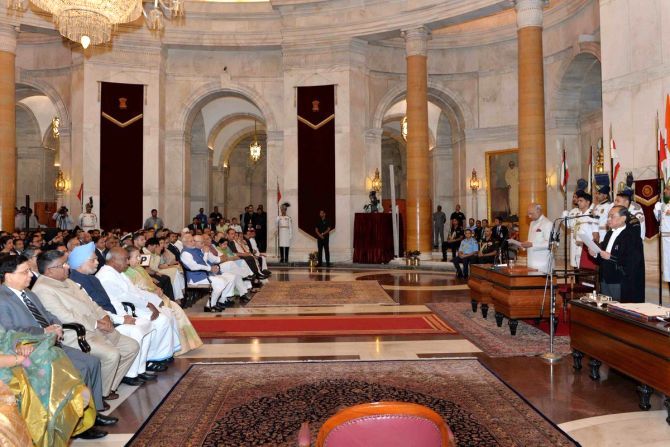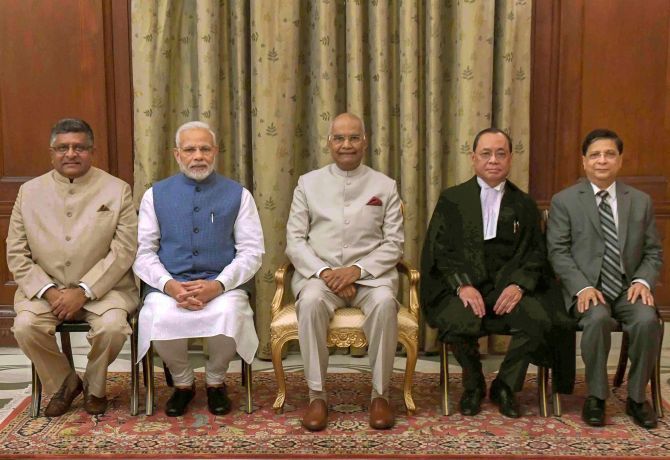Speculation over Justice Gogoi's appointment as the next CJI arose after the court's four most senior judges, including Justice Gogoi, called a press conference in January and criticised Justice Misra on various issues.

Justice Ranjan Gogoi was Wednesday sworn in as the 46th chief justice of India.
President Ram Nath Kovind administered the oath to Justice Gogoi, 63, at a brief ceremony in Rashtrapati Bhavan's historic Darbar Hall.
Justice Gogoi, who took the oath in English in the name of god, will have a tenure of a little over 13 months and will retire on November 17, 2019.
He succeeds Justice Dipak Misra who retired on Tuesday on attaining the age of 65 years.
Several leaders, including Prime Minister Narendra Modi, his predecessor Manmohan Singh and former premier H D Deve Gowda were present at the ceremony.
Leader of the Congress in the Lok Sabha Mallikarjun Kharge and Trinamool Congress leaders Sudip Bandhpadhyay and Derek O'Brien were among the opposition leaders present at the event.

Justice Gogoi's predecessor Dipak Misra was seen shaking hands with dignitaries before the ceremony began.
Former CJIs, including T S Thakur and J S Khehar, were also present.
Justice Gogoi, the first person from the Northeast to reach the top position in the judiciary, was appointed chief justice of India on September 13.
Born on November 18, 1954, Justice Gogoi, who belongs to Dibrugarh in Assam, enrolled as an advocate in 1978.
He did his schooling in Don Bosco School Dibrugarh before studying history in Delhi University's St Stephen's College.
Son of former Assam chief minister Keshab Chandra Gogoi, he was enrolled as an advocate in 1978.
He practised in the Gauhati high court on constitutional, taxation and company matters.
He was appointed permanent judge of the Gauhati high court on February 28, 2001.

On September 9, 2010, he was transferred to the Punjab and Haryana high court.
The following year, on February 12, 2011, he was appointed chief justice of the Punjab and Haryana high court and then a judge of the Supreme Court on April 23, 2012.
Justice Misra had earlier this month recommended Justice Gogoi as his successor in accordance with the established practice of naming the senior-most judge after the CJI for the post.
Speculation over Justice Gogoi's appointment as the next CJI arose after the court's four most senior judges, including Justice Gogoi, called a press conference in January and criticised Justice Misra on various issues, especially the manner of allocation of cases to certain benches.
Justices J Chelameswar (since retired), Madan B Lokur and Kurian Joseph were the others who addressed the press conference, perhaps a first in the history of the Indian judiciary.
According to the Memorandum of Procedure, which governs the appointment of members of the higher judiciary, "appointment to the office of the Chief Justice of India should be of the senior-most judge of the Supreme Court considered fit to hold the office".
It stipulates that the law minister will, at an appropriate time, seek the recommendation of the outgoing CJI for the appointment of a successor.

Under this process, after receiving the CJI's recommendation, the law minister puts it before the prime minister who advises the president on the matter.
Days after the controversial press conference, he remarked at a public function that "independent judges and noisy journalists are democracy's first line of defence".
A "revolution, not reform" was needed to keep the institution of judiciary serviceable for the common man, Justice Gogoi had said at the same function.
Last week, at another public function, he had mentioned about his priority as the chief justice of India to combat the backlog of cases .
On Monday at the farewell function for Justice Misra, Justice Gogoi was said people are divided "more than ever" along the lines of caste, religion and ideology and what one should wear, eat or say are no longer insignificant questions about personal life.

The judge was of the view that beliefs must be constantly evaluated on the touchstone of constitutional morality which must prevail when there arises any doubt or conflict and had said this is true patriotism to the Constitution.
Justice Gogoi brushed aside the claims that the system had not fared well and said despite odds, a number of judges were committed to the cause.
"System has done well. In spite of odds we have a lot of committed judges committed to the cause and they will continue to be committed regardless of the inadequacies in terms of remuneration, in spite of the possibilities of abuse of their names," Justice Gogoi had said, adding, "We don't have to be alarmed of that. It comes with the system".
Justice Gogoi has delivered various significant judgements, including Assam's National Register of Citizens, setting up of special courts to exclusively try MPs and MLAs, Rajiv Gandhi assassination case convicts for remission of their life sentences and appointment of anti-corruption ombudsman Lokpal among others.

Law Minister Ravi Shankar Prasad recently said the government's intention on the appointment of the next chief justice of India should not be questioned.
He had also said the executive will take a call when the incumbent names the senior-most judge of the Supreme Court as his successor as per convention.
Prasad was responding to a question at the law ministry's annual press conference on whether the government will follow laid-down conventions and procedures to appoint Justice Gogoi as Justice Misra's successor.
"The question is imaginary...as far as the appointment of the chief justice of India is concerned, the convention is clear...the sitting chief justice names the senior-most judge (of the top court) as his successor. When the name comes to us, we will discuss it," he had said.










